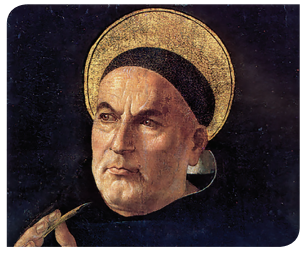Chapter: 11th Political Science : Chapter 7 : Political Thought
St. Thomas Aquinas(1224/1225-1274) - Political Thought
St. Thomas Aquinas
Learning Objectives
·
To study
about the Political thought of St.
Thomas Aquinas
·
This will help to
understand Aquinas’s concept of law
· To gain knowledge about Acquinas’s ideas on Origin of State, Functions of the State, Classification of Government, Classification of Laws, Relations between Church and the State.

Life And Times
In Western Europe the thirteenth Century was
regarded as the golden age of western medieval philosophy. Catholicism emerged
as the universal religion in Western Europe. Eventually Aristotle’s Politics,
re-emerged during the thirteenth century. Sharp differences arose between Aristotle’s
secular views and Augustine’s religious ideas on sin, the Fall, and political
society which were accepted by the church and as a binding doctrine. However,
some philosophers faced the challenge of how to accommodate their theological
views and a set of secular political assumptions, which finally resulted in the
reconciliation of two different ways of understanding the world. They finally
succeeded by terming politics and political theorizing as a trivial pursuit
vis-à-vis people’s higher calling of getting right with God. St.
Thomas Aquinas was the greatest among these Christian theologians who
architected this major philosophical triumph.
St. Thomas Aquinas
(1224 or 1225-1274) was born in the family castle of Roccasecca, north of
Naples. His father was Landulf of Aquino, who headed a minor branch of an
important land owning family and his mother was Theodora Rossi belonging to
Neapolitan Carracciolo family.

Aquinas’ Works
In the nineteenth century, Pope Luis XIII declared
that the philosophical system which Aquinas founded to be official Catholic
theology, which made reading his works not only important for Catholics but
also for those who sought a more than surface understanding of that branch of
Christianity. Aquinas works included commentaries that stem from his
theological design. Some of his important works include, (i) Summa Contra
Gentiles (1264), (iii) Summa Theologica (1274) and (iv) On Kingship.
![]()
Aquinas’ Thought
Summa Contra Gentiles
It has often been said that Aquinas wrote the Summa
Contra Gentiles (SCG) as a manual or text book designed to be used by the
Dominican missionaries working in Spain where Islam was then a force to be
reckoned with by Christians. The SCG is evidently an apologetic work, since it
defends a series of Christian beliefs that were under criticisms or that could
come under potential criticisms.
Summa Theologica
In his Summa Theologica, Aquinas establishes the
existence of four levels of law which had an underlying unity which is reason.
What differentiates one form of law from the other is the level of reason
involved. The highest and most comprehensive among them is eternal law which is
reason that is operative in the universe as a whole. It is the natural and the
ethical order which God had established. The next is divine law which is a
special category of eternal law which is the revealed word of God in the
Scripture.
The next level of law, Aquinas identifies as the
natural law. The idea of natural law goes back to the stoics and refers to
moral law that is discovered by reason alone. It assumes that man has the
capacity to reason and arrive at certain
ethical conclusion that would be binding on them whether it is specified
in the law or not. For example, we do not need to have a criminal code to
understand that murder is wrong and behave accordingly. The uniqueness of
Aquinas’ theory of natural law is that it establishes a link between the
natural and the supernatural – between nature and spirit. This is so because,
says Aquinas, that right and wrong are determined by God’s eternal law and
hence natural law is nothing else that the rational creature’s participation in
the eternal law. Human’s moral reasoning is in short the extension of the
spiritual principle that transcends nature. Finally, human law is the
application of human reason to the precepts of natural law in specific earthly
conditions.
On Kingship
The political theory of Aquinas closely parallels Aristotle’s.
His writings ‘On Kingship’ can be considered as the most methodical political
work. Aquinas largely follows the pattern of arguments that were adopted by Aristotle
in his ‘Politics’. He argues that the State is natural because it is natural
for man… to be a social and political animal, and to live in a group.
Consequently he emphasizes that political activity in necessary and good.
Aquinas further like Aristotle, roots people’s political
nature in their capacity to reason and to speak. Subsequently he emphasizes
that it is through reasoned action in the political sphere that humans achieve
virtue and there for happiness and fulfilment. Like Aristotle, he believes
that the state is a moral community where the moral good of its members are
considered as its objective. Thus, he argues that the state should be based on
justice and the best should rule for the good of the public which should be
under the constraints of law. Such an argument leads us directly to the problem
of classifying constitutions and yet again Aquinas follows the principles of Aristotle
by using both qualitative and quantitative methods. He classifies constitution
by the number of those who rule and the quality of their rule.
Assessment
St. Thomas Aquinas
who is regarded as one of the great figures of medieval thought founded a
tradition which came to be known as Thomism. The basis of his political theory
can be found in his commentary on Aristotle’s Politics in de regimineprincipum
(on the Rule of Sovereigns) while he was at the papal court in Italy (1259-68).
Following Aristotle he held that the state is a natural and
not a conventional institution and it is a perfect society (communities
perfecta). He argued that it is natural and not conventional because human
beings were social animals. They needed to form a society to survive, prosper
and for their cultural development. Gregarious animals do this by instinct but
humans on the other hand do it by reason.
All power according to Aquinas comes from God since
it involves the power of life and death which in the Church’s doctrine is a
prerogative of God. It is at this juncture that Aquinas deviates from Aristotle
but returns when he turns to the question of the sovereign which is
natural. It is natural in that without a governing body capable of making
decisions that would be binding, it would result in anarchy and people would
destroy each other. The sovereign or government in the view of Aquinas is the
representative of those governed.
The state therefore, is not in any way dependent on
the church. Aquinas argued that each had a separate role and an end.
Related Topics